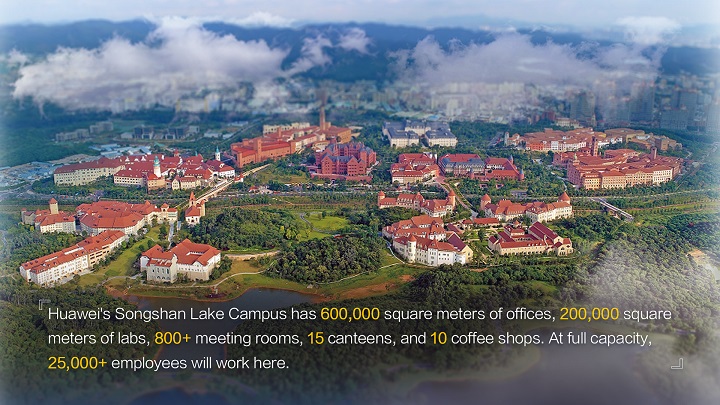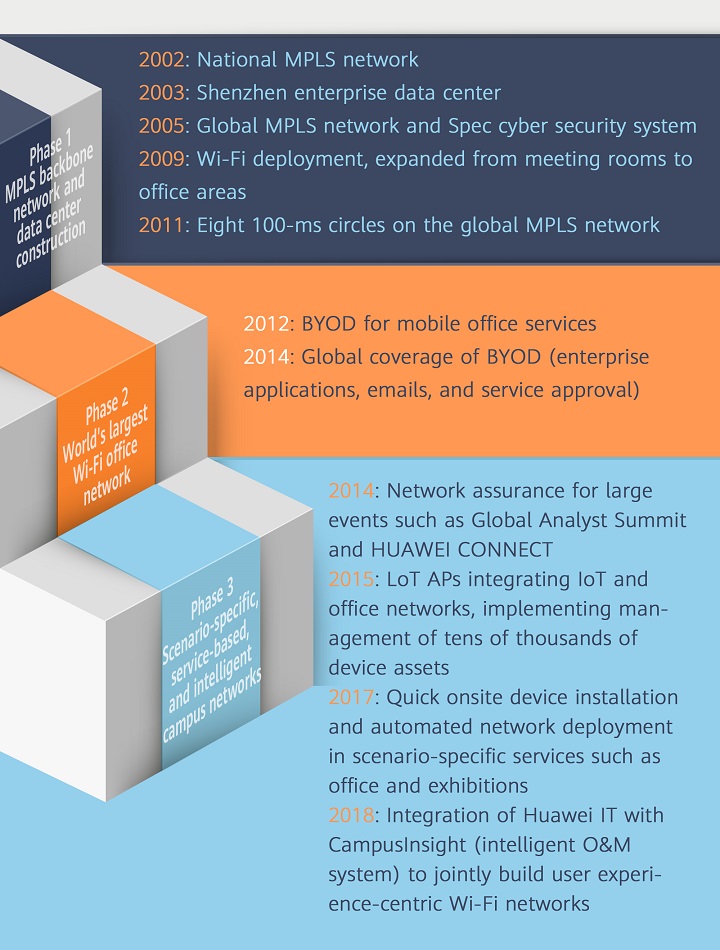Enterprise products, solutions & services
188,000 Huawei employees are dedicated to helping customers succeed in 170 countries and regions.
14 R&D centers, 36 innovation centers, and 1000+ offices span the globe.
1.5+ million contracts and 500+ million Purchase Orders (POs) are signed and sealed every year, with an average year-on-year growth of over 50%.
2.8+ million emails are send and 80,000+ meetings are held every day.
600+ applications run efficiently on systems, including Integrated Product Development (IPD), Integrated Supply Chain (ISC), Customer Relationship Management (CRM), Integrated Financial Services (IFS), and Huawei IT Service (HIS).
No Huawei employee can excel in their work without these processes, platforms, or applications — but what powers these systems?The secret is: a secure, reliable, and stable IT network system.
To understand how everything fits together, take a visit to Huawei's Songshan Lake Campus located in Dongguan, China.






The campus has 600,000 square meters of office space, 200,000 square meters of labs, more than 800 meeting rooms, 15 canteens, and 10 coffee shops. At full capacity, over 25,000 employees work there.
All these services are built on HIS, which defines dozens of standard service modes and combines these service modes to serve a variety of scenarios, including:
• Offices: office desktop, cloud printing, electronic whiteboard, intelligent access control, Internet Protocol (IP) phone, Wi-Fi, Wide Area Network (WAN), and data storage services.
• Meeting rooms: room scheduling, voice phone, wireless projection, and Wi-Fi.
HIS supports a range of scenarios — shops, factories, supply centers, exhibitions, meeting rooms, offices, and operation centers — and meets various network and service deployment requirements. On HIS, service departments can quickly subscribe to network services. The network then automatically provisions resources, adjusts and configures policies, and evaluates and detects service quality, greatly improving deployment efficiency.
The planning, construction, maintenance, optimization, and operation of each network are not only the result of a single innovation or breakthrough, but through the accumulation of many years of experience as well. By building a solid foundation and practicing continuous improvement, HIS processes become standardized. The figure below shows how Huawei IT networks have developed over the years.

Huawei is a leading global ICT infrastructure provider that will never cease to explore innovative digital transformation practices for its 188,000 employees. These proven in-house innovations also improve the product and solution offerings that help customers meet their digital transformation needs. Take the CloudCampus Solution as an example. This feature-rich Solution combines Agile Controller (a one-stop management center), CampusInsight (an AI-powered intelligent O&M platform), AirEngine series Wi-Fi products, and CloudEngine S series campus switches, to build ultra-fast, experience-centric, intelligent, and open campus networks. The Solution has been widely used by over 300 customers across various sectors including government, real estate, education, the chemical industry, and manufacturing. With this award-winning solution, customers reap a wealth of tangible benefits, including rapid launch of innovative campus services, improved operational efficiency, and simplified experience.
Advanced, efficient networks are must-haves for an enterprise’s digital transformation initiative. Huawei is committed to the pursuit of future-oriented Research and Development (R&D) and design concepts, as well as providing the most advanced and suitable network solutions for customers in various industries worldwide, facilitating their digital transformation. Huawei believes that ICT is in the reach of every enterprise and is dedicated to bringing digital to every person, home and organization for a fully connected, intelligent world.